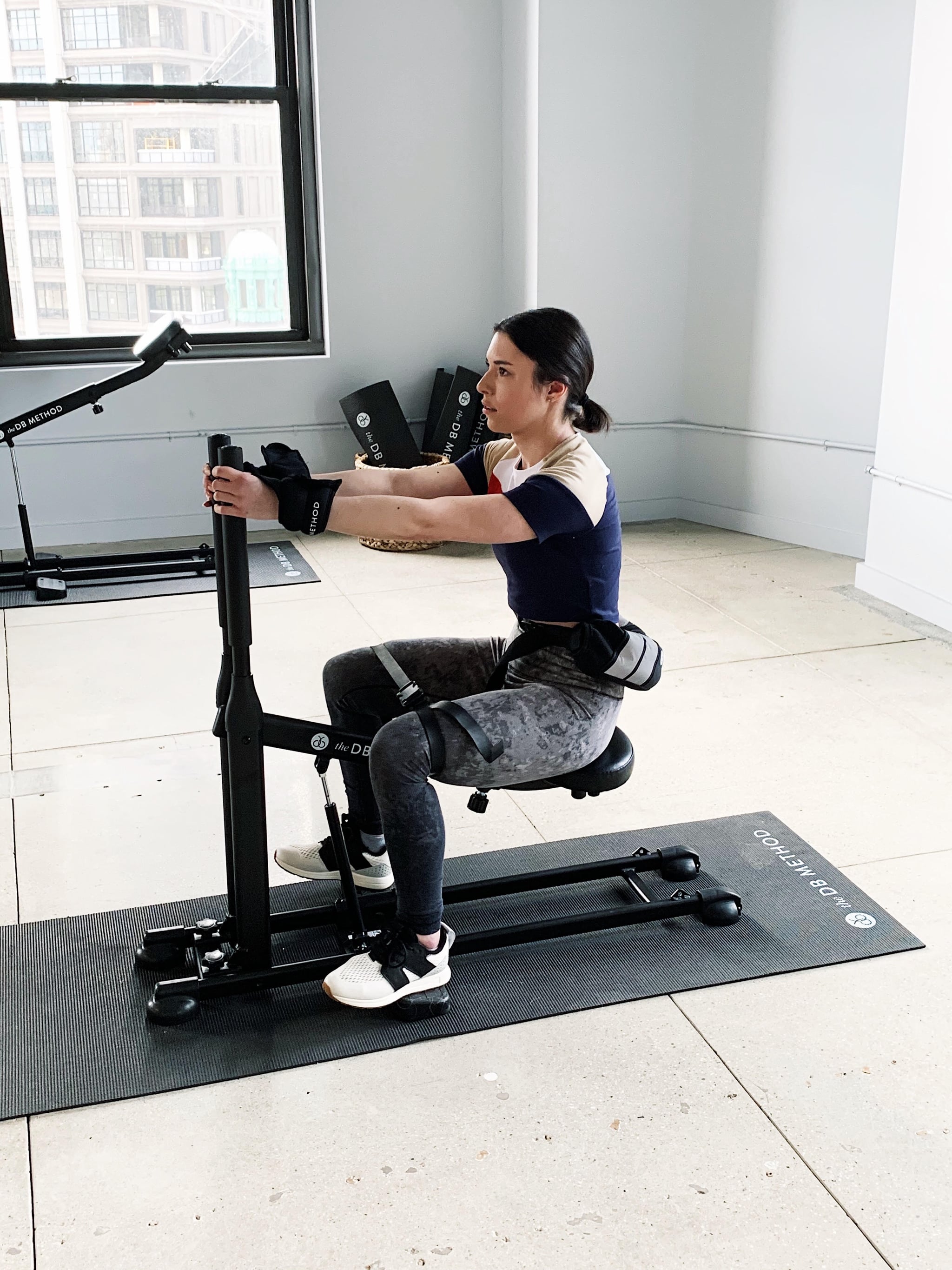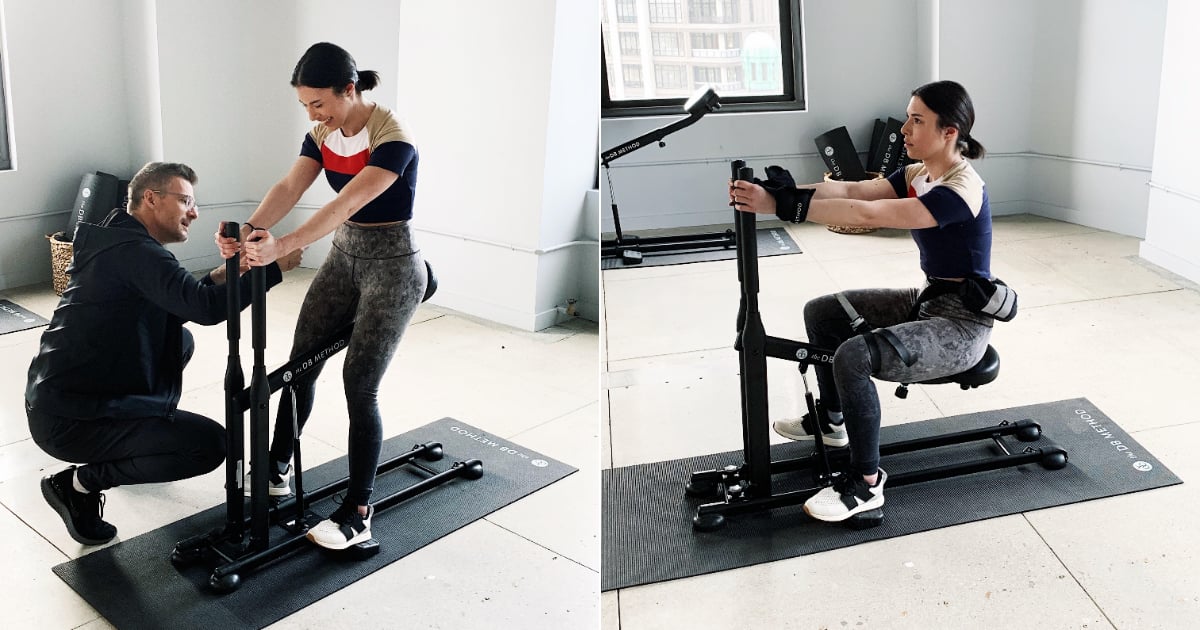I love a good squat, but I know that it isn’t as effective at targeting my glutes as I once thought (aka, when I used to take on 30-day squat challenges in high school long before I came into this industry and did my research). In fact, though squats recruit your glutes and hamstrings, they target the quads, or the front of your thighs, primarily. So when I heard of a squat machine that promised greater glute activation to build up booty strength, I was excited to give it a try in March 2020. It’s The DB Method, and I was 100-percent floored by my experience using it.
Some quick background: The DB Method officially launched in the beginning of 2017. There are 220 pounds of preset resistance built into The DB Method’s tension rod, and you can buy add-ons like resistance bands, wrist and ankle weights, and a 10-pound DreamBelt. The DB Method cost $229 when I reviewed it but starts from $329 now. It also now includes something called a “DreamMount” to hold your phone or tablet, which wasn’t available when I tested out the machine.
The DB Method Machine: What’s It Like?
Founder Erika Rayman told me during my private DB Method training session that she initially wanted to create this foldable, easy-to-use device because she was searching for a way to make squats more effective on her own glutes. At first glance, I was skeptical. The DB Method basically looks like a seesaw contraption with handles and a cushion to sit on, and DB Method chief fitness officer Adam Swartz, a personal trainer with over 20 years of experience, walked me through how to use the machine. It’s a little awkward at the beginning when you squat with your toes up on the foot pads (which you can see in the pictures I’ve included or the GIFs ahead), but to my pleasant surprise, I felt my glutes firing within a few reps.
The DB Method is designed so that you’re leaning back on a slant, and it shifts your center of gravity away from your legs. What The DB Method does, Swartz said, is support and guide your weight back and in line with your hips. “This position keeps the work primarily focused around the hip joint, allowing easier access to glute activation,” he explained.
The key to proper form while using this machine is similar to how you’d perform a normal squat. Otherwise, if your form breaks, you could start leaning forward and revert to doing quad-dominant squats. Swartz instructed:
- Brace your core.
- Keep your shoulders away from your ears (pulling down through your lats).
- Transfer tension outward through your knees as though you’re pushing against a booty band.
I was also able to go lower into my squats than I typically would with dumbbells or a kettlebell, which caused me to feel my glute muscles working. Going down deep into your squat on the machine, Swartz said, is an advanced move because the glutes are being stretched more the deeper you go. He explained, “There is less leverage at the lowest ranges and therefore the glutes must work much harder to pull the body out of that position.” Note: Swartz said, too, that adding one of The DB Method’s bands helps people activate their glutes better while using the machine since they’re actively pushing against the band to tap into the gluteus medius and gluteus minimus.

Image Source: POPSUGAR Photography / Sam Brodsky
Swartz had me add the heaviest band, which has 78 pounds of resistance (the lighter one is 45 pounds), as well as the 10-pound DreamBelt. This made me feel my glutes work even harder, and I added in wrist weights at one point, too. I was also impressed to learn that you can use The DB Method for arm and ab exercises, not just for squats. Before I tested out a 10-minute squat-only workout, Swartz had me try variations of standing crunches, for example.
As for the workout, I was NOT prepared for what was in store for me even though I have a lot of lower-body strength from my years as a competitive gymnast. I was shocked by how much I felt my glutes working in just two minutes of the 10-minute session, and the pulses incorporated throughout burned most of all. I was sore for two days — I may or may not have been walking at a snail’s pace around my office for the rest of the afternoon post-workout.
Swartz wanted to reiterate that the workout I did was advanced. “For beginners, the best way to start is to really drill in the ‘activation phase’ or to find the correct form,” he said (note: he’s talking about the proper form explained earlier). If this is your first time working out in general, or you’re just getting back into exercise, he suggested beginning with squats where you lower only one-third of the way down. This would be a “high-zone squat,” and you can go deeper when you’re more comfortable. Here’s a beginner DB Method workout to start.
10-Minute Advanced DB Method Booty Workout
I shared a time lapse of this 10-minute workout on my Instagram, but you can find the details below. And remember that before you begin any workout, it’s important to warm up.
- 1 minute: full squat with band
- 30 seconds: mid-zone pulse with band
- 1 minute: full squat with band
- 30 seconds: low-zone pulse with band
- 1 minute: full squat
- 2 minutes: plié squat
- 1 minute: full squat
- 30 seconds: mid-zone pulse
- 1 minute: full squat
- 30 seconds: low-zone pulse
- 1 minute: full squat
If you’re interested — which I know I was following my DB Method training session — you can find more DB Method workouts on YouTube and on the digital app that launched in December 2020 (it’s free, but you need a premium subscription to access the entire library of classes and challenges). Ahead, check out some of the moves featured in my squat-only workout along with others I tried prior, including those that targeted my abs and arms. Thanks for the burn, DB Method! After receiving a machine, I still use it to this day.
